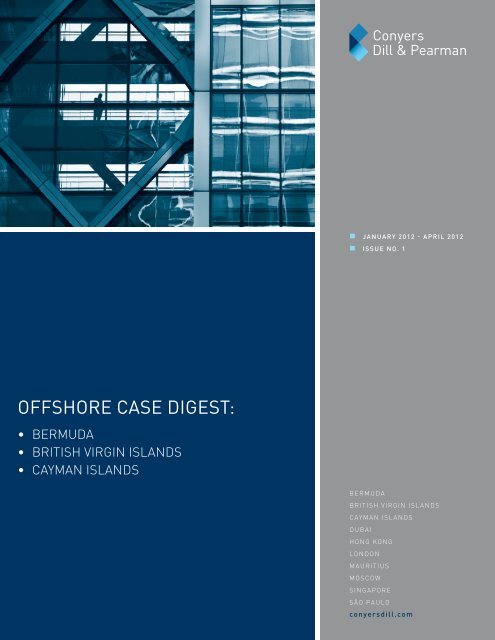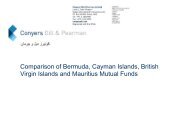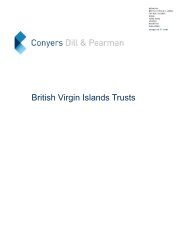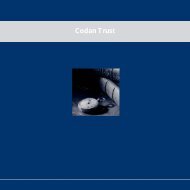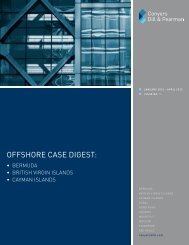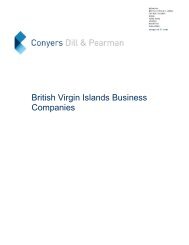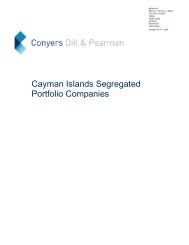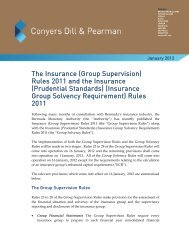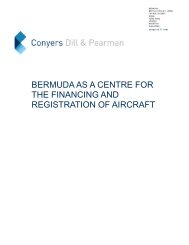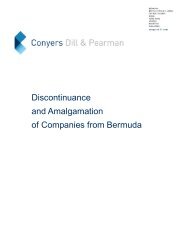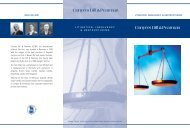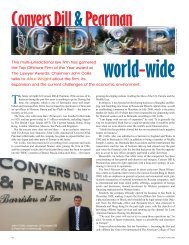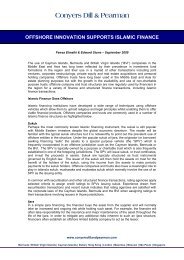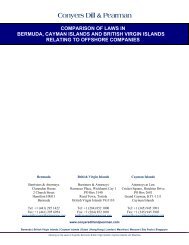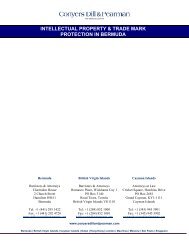OFFSHORE CASE DIGEST: - Conyers Dill & Pearman
OFFSHORE CASE DIGEST: - Conyers Dill & Pearman
OFFSHORE CASE DIGEST: - Conyers Dill & Pearman
You also want an ePaper? Increase the reach of your titles
YUMPU automatically turns print PDFs into web optimized ePapers that Google loves.
BERMUDAIn the event, the Chief Justice ruled that there was nomaterial change of circumstances which would warrant hisreconsidering the previous decision to stay the proceedings.MarchEMPLOYMENT – SPRINGBOARD RELIEF – RESTRICTIVECOVENANTSIn the Matter of an Injunction Application for ‘Springboard’Relief), 2011 Civil Jurisdiction No. 35 [original location: SCVol. 76, p. 239], [2012] SC (Bda) 15 Com (9 March 2012)In the first decided case in Bermuda on the developing area of‘Springboard’ relief, the Court granted the Plaintiff company exparte injunctive relief against a group of former employees whohad resigned in concert from the Plaintiff and, it was alleged,had taken confidential information with a view to assisting acompeting business.The Plaintiff sought and obtained various injunctive orders,including that the Defendants deliver up material taken, berestrained from use of confidential information, honour theircontractual restrictive covenants, and provide sworn evidenceanswering the allegations.In reliance on the English decision in UBS Wealth ManagementUK Limited v Vestra Wealth LLP [2008] EWHC 1974 (QB),the Court also applied the balance of convenience test beforeordering an initial period of ‘Springboard’ relief. This was toprevent the Defendants from using their own wrongdoing as aspringboard from which to gain an unlawful head-start with thecompeting business.COMPANIES – WINDING UP PETITION – JPLS’STANDING TO BRING PETITIONRe Kingate Management Limited and the CompaniesAct 1981, 2011 Commercial Court Jurisdiction No. 301[original location: SC Vol. 76 p 232] (6 March 2012) , is acase involving another round in the ‘Kingate’ litigation, a multipartyaction commenced in 2009 after the Bernard Madoffcollapse. The substantive case concerns whether subscriptionmonies paid for shares in a now-insolvent Fund are repayableas a debt or held on trust for the would-be subscribers.The recent application concerned the winding-up of thenamed (related) company, which was sought by the JointProvisional Liquidators (“JPLs”) or, in the alternative, by theCompany itself (acting by its shareholders the directors havingresigned). The Court took the opportunity to articulate the legalbasis for jurisdiction under the Companies Act 1981 and, morespecifically, ss. 161 (grounds for winding up by the Court) and175(1)(a) (applying to JPLs).In so doing, the Court confirmed that JPLs lacked jurisdictionto wind-up a company under s.175(1)(a) in circumstanceswhere there was no practical impediment to the Companyitself, or its creditors, seeking the Order. The Court wound upthe Company on the basis that the grounds were made out bythe Company under s.161(a) or by any potential creditor unders.161(e). In the alternative, the Court could, of its own motion,wind the Company up pursuant to those sections where, ashere, the Company was insolvent.The Order for springboard relief was subsequently dischargedat a later hearing although the other restraints continued. Thisdecision shows the Bermuda Court is prepared to restrainparties where appropriate under this equitable doctrine.conyersdill.com • 6
BRITISH VIRGIN ISLANDSBVI COURT OF APPEALDecemberPROCEDURE – BVI APPEALS – STAY OF PROCEEDINGSPENDING APPEAL – ENFORCEMENT OF SHARECHARGESCukurova Finance International Limited and CukurovaHoldings AF v Alfa Telecom Turkey LimitedThis claim concerned the enforcement of share charges givenby Cukurova to secure sums totaling approximately US$1.352billion advanced under a loan facility by Alfa to Cukurova. TheCourt of Appeal previously granted several declarations whichconcerned Alfa’s rights and ownership of 51 shares followingdefault under the loan facility. The Court of Appeal broughtclarity and certainty on the law concerning the jurisdictionof the Court of Appeal to stay the execution of its own orderwhen granting leave to appeal to the Privy Council. It had beencontended that the code of procedure for appeals to the PrivyCouncil constituted by the Virgin Islands (Appeals to PrivyCouncil) Order 1967 and the Judicial Committee (AppellateJurisdiction) Rules Order 2009 (“the 2009 Judicial CommitteeOrder”) has impliedly and altogether excluded the Court ofAppeal’s inherent jurisdiction to stay an order of its own andcontinue or grant an injunction pending an appeal to thePrivy Council, where to do otherwise may render the appeal,if successful, nugatory. The court held that section 39 of the2009 Judicial Committee Order, recognizes the existence ofthat inherent jurisdiction and empowers the Court of Appeal tostay an order appealed from and grant an injunctive order, orcontinue or discontinue an injunctive order made in the courtbelow. The Court also confirmed that a declaratory judgmentcannot be stayed since it merely proclaims the existence of alegal relationship and does not contain any order which maybe enforced against an appellant/applicant.JanuaryPROCEDURE – LEAVE TO APPEAL – LEAVEAPPLICATION TO BE EX PARTECAGE St Lucia Limited v Treasure Bay (StLucia) Limitedand The Gamining Authority and The Attorney General ofSaint Lucia and the National Lotteries Authority (Court ofAppeal) (St Lucia)This concerned an action arising from an application made tothe High Court by CAGE to be joined as a party to judicial reviewproceedings in the court below. The trial judge had dismissedthe application. CAGE applied for permission to appeal thatorder (the first application) and for an order staying the judicialreview proceedings pending the hearing of the appeal (thesecond application). The first application was heard by a singleconyersdill.com • 9
BRITISH VIRGIN ISLANDSjudge on paper and granted without hearing the parties. Thesecond application was considered by a separate single judgeand was granted following an inter partes hearing. TreasureBay then applied to the Full Court to revoke, vary, or dischargeboth the orders of the single justices. The Court of Appeal heldthat CPR 62.16(A) which gives the Court jurisdiction to varydischarge or revoke any order or direction or decision givenby a single judge only applies to interlocutory orders madewithin the context of a pending appeal. The jurisdiction wouldnecessarily not arise where a Notice of Appeal had not beenfiled because then it could not be said that the orders weremade within “the context of a pending appeal”. The ordergranting a stay was said to be a nullity. Second, the court citingJolly v Jay [2002] All E.R. (D) 104 held that an application forleave to appeal was essentially a without notice procedure andsuch applications were not strictly interlocutory applications.It was said that dealing with applications for leave to appealin this manner promoted proportionate, cost-effective andexpeditious resolution of cases, was in keeping with theoverriding objective, while at the same time mindful of theconstitutional guarantees to all litigants. The Court was of theview that denying a respondent the opportunity to participateat the leave stage would not prejudice the respondent’ssubstantive rights. Treasure Bay therefore was not entitledto file a notice of objection or otherwise oppose CAGE’sapplication for leave to appeal.COMPANIES – RECTIFICATION OF REGISTER – BVIBUSINESS COMPANIES ACT S. 43 – SCOPE OFJURISDICTIONRoyal Westminster Investments S.A and Bhagwan Mahtaniand Sunder Dalamal and Nari Dalamal v Nilon Limited andManmohan Varmaregistered. The judge at first instance said it did not becausethe purpose of section 43 of the BCA was to enable the courtto ensure that the company’s register of members accuratelyreflected the state of its membership and was not there toestablish title to shares. The Court of Appeal disagreed.The case concerned a joint venture agreement entered intoby the second appellant, third appellant, fourth appellant andsecond respondent whereby it was agreed that they wouldcarry on the business of importing and selling rice in Nigeria,carried out through a company to be incorporated. It was agreedthat each joint venturer was to contribute to the capital of andsubscribe for shares in that company in agreed proportions.The second defendant caused the first defendant to beincorporated and procured that the shares would be allottedto himself only. The claimants sought, inter alia, rectificationof the register in order to reflect the terms of the joint venturearrangements. The Court of Appeal held applying Re HoicrestLtd [2000] 1 BCLC that the discretion conferred on the courtby section 43(2) of the BCA to determine any question relatingto the right of a party to rectification proceedings to have hisname entered in or omitted from the register of members waswide enough to permit inquiry into the substantive cause forthe inclusion or omission, even if that question arises betweenthe members or alleged members and does not involve thecompany. The Court is required in such proceedings to haveregard to the equitable as well as the legal rights vested in sucha party. The Court also held applying Re Starlight DevelopersLimited [2007] B.C.C 929, that it was not obliged to strike outan application for rectification of the register where the partyclaiming such relief is unable to assert a present entitlementto registration.FebruaryThe issue on appeal was primarily whether the scope ofthe Court’s discretion under section 43 of the BVI BusinessCompanies Act (BCA) permitted the Court to order therectification of the register of members where the Applicantcould not demonstrate that it clearly had a present right to beCOMPANIES – INSOLVENCY – STATUTORY DEMAND –DISPUTED DEBT – EVIDENCEAngel Wise v Stark Moly Limitedconyersdill.com • 10
BRITISH VIRGIN ISLANDSThe Appellant company sought to appeal the decision toappoint liquidators over it following the Appellant’s failure to setaside a statutory demand served on it. The grounds of appealincluded an allegation that the Learned judge misdirectedhimself by substituting his own opinion for that of the expertrelied on by the Appellant in the court below. Applying the dictain Eng Mee Yong & ors v Letchumanan [1980] A.C. 331, theCourt held that although in the normal way it is not appropriatefor a judge to attempt to resolve conflicts of evidence onaffidavit, this does not mean that the judge is bound to acceptuncritically every affidavit statement however equivocal andlacking in precision it may be as raising a dispute of fact whichcalls for further investigation. In order to determine whether adispute was substantial the Court had to carry out a preliminaryassessment of the facts on which the injustice was raised. Itwas for the Judge to determine in the first instance whetherstatements contained in affidavits that are relied on as raisinga conflict of evidence on a relevant fact, have sufficient primafacie plausibility to merit further investigations as to their truth.The appeal was dismissed.MarchCPR rule 7.3(3)(b) on Swisstor and Wise Global Wise. Leavewas subsequently set aside by the Commercial Judge. TheReceiver appealed. The Court of Appeal made three (3) notablefindings. First, that the Learned Commercial Judge construedCPR 7.3(3)(b) too narrowly. The Court followed E.F. Hutton &Co (London) Ltd. v Mofarrij which held that a claim sufficiently“affected” a contract if there was a “sufficient direct link” to thecontract. Second, the power in CPR 8.13 to extend the validityof the claim form is only to be exercised for “good reason”.Third, that Swisstor and Wise Global had a right to be sued bymeans of a claim issued within the statutory period of limitationand served within the period of the validity of the claim form.The court observed that the statutory limitation period shouldnot be made elastic at the whim or sloppiness of a litigantand the public interest required that claimants adhere strictlyto the time limit for service or else provide a good reason fordispensation. In coming to this decision the Court applied City& General (Holborn) Ltd. v Royal & Sun Alliance plc [2010] 131ConLR; [2010] BLR 639; [2010] EWCA Civ 911.COMPANIES – INSOLVENCY – WINDING UP ORDER –PROCEDURE FOR CHALLENGEPROCEDURE – CPR 7.3(3)B – CPR 8.13 – SERVICE OUT– CLAIM “AFFECTING A CONTRACT” – RESTITUTIONIgors Kippers et al v Stanford International Bank Limited(In Liquidation)Marty Steinberge, Receiver and Lancer Offshore Inc, TheOmnifund Limited v Swisstor & Co and Wise Global FundLimitedThe claim was essentially one for repayment of moneymistakenly and/or fraudulently paid under a contract. Therespondents, Swisstor and Wise Global and others, hadinvested in funds held by Lancer and Omnifund, which wereoperated as a Ponzi scheme. Swisstor and Wise Global hadbenefitted from dishonestly calculated redemptions by severalmillion dollars each. The Receiver began proceedings inthe BVI seeking restitution of the moneys paid to Swisstorand Wise Global. The court below granted the Receiverpermission to serve the claim form out of the jurisdiction underThis appeal brought under s. 11 of the Eastern CaribbeanSupreme Court (Antigua and Barbuda) Act concerned thejurisdiction of the Master to raise an issue and pronounceon the validity of claims brought after Stanford InternationalBank was placed into compulsory liquidation. The Court held,inter alia, that in the absence of local statutory provisions andrules regulating the practice and procedure for challenginga winding up order made pursuant to section 304 of theInternational Business Act or relating to proceedings duringthe pendency of the winding up proceedings against or onbehalf of the Company in liquidation, The Third Group of Parts:Part V11 in the English Insolvency Rules 1986 as amendedrelating to the Court Procedure and Practice Direction PD5relating to the Distribution of Business of the Companies Courtconyersdill.com • 11
BRITISH VIRGIN ISLANDSin England applied. This decision has far reaching implicationsfor the British Virgin Islands because section 11 of the EasternCaribbean Supreme Court (Antigua and Barbuda) Act andPractice Direction are identical to the corresponding provisionin the BVI which means that the English Insolvency Rules willapply to challenges to winding up orders in BVI as well as inconnection with bringing claims in the liquidation.AprilBVI – S. 11 EASTERN CARIBBEAN SUPREME COURTACT – RECEPTION PROVISIONS – EXTENT AND SCOPEOF THE APPLICATION OF ENGLISH LAW TO BVI <strong>CASE</strong>SVeda Doyle v Agnes DeaneThis appeal concerned the construction of section 11 of theWest Indies Associated States Supreme Court (Grenada)(the Supreme Court Act) a provision which for the mostpart duplicated in the Supreme Court Acts of the other eight(8) Eastern Caribbean Territories. The Court held that theEnglish law intended to be imported by section 11(1) of theSupreme Court Act is the procedural law administered in theHigh Court of Justice in England and not English substantivelaw, nor English procedural law which is adjectival and purelyancillary to English substantive law. The wording of section11(1) indicates that the focus on the importation of any law,rule or practice from England is in respect of the exercise ofthe jurisdiction as distinct from the importation of English lawso as to give jurisdiction. Panacom International Inc. v SunsetInvestments Ltd. and Another (1994) 47 WIR 139 followed;Dominica Agricultural and Industrial Development Bank vMavis Williams Commonwealth of Dominica Civil AppealNo. 20 of 2005 (delivered 29 th January 2007, unreported)distinguished. This decision has injected much needed clarityinto the interpretation of section 11 which hereintobefore wassaid to either constitute the common law of England and notStatute or the entire laws of England including statute. Thisdecision has clearly said that it is neither. In the LearnedJudges’ views “the notion that all Member States are subject tothe importation of English substantive law by virtue of section11 would leave much to be desired in any sovereign State notto mention the state of uncertainty as to what laws a citizenof the State may be subject at any given point in time andwithout regard to its own parliament which is charged with themaking of laws for the State as it may deem necessary for thatState’s good governance. Section 11 certainly could not havebeen intended to have this effect...the focus on the importationof any law, rule or practice is in respect of the exercise of thejurisdiction, as distinct from the importation of English lawso as to give jurisdiction.”BVI HIGH COURTDecemberCOMPANIES – BVI – S. 31 BCA – UNOPPOSEDSUMMARY JUDGMENT APPLICATION – DEALINGSBETWEEN COMPANY AND THIRD PARTIESPotential Might Group Limited v GST InternationalManagement Ltd (Commercial Division) BVI December2011The Claimant applied for summary judgment of its amendedstatement of claim which sought declarations that a subscriptionagreement entered into between it and GST International wasbinding, that the resolution of the Board which Potential reliedon making its investment is valid and that the Claimant holdsthree million shares in GST. The claim and the application wereundefended. The Court held that an application for summaryjudgment should not be treated as if it were an application fordefault judgment. Even if the application is unopposed thediscretion presented by CPR rule 15.2(b) means that the Courtmust be satisfied that there is no real prospect of a successfuldefence being raised to the claim being made. In the courseof the hearing the court was required to construe section 31 ofthe Business Compnaies Act 2004, which deals with dealingsbetween companies and other persons. The Court held thatconyersdill.com • 12
BRITISH VIRGIN ISLANDSsubsection 31(b) requires that a person be held out as adirector by the company. If a person holds himself out thenthe section would not be engaged. Further, subsection 31(1)(d) which dealt with ostensible authority and subsection 31(1)(d) applied when a company sought to challenge the validity ofa document issued by a director with actual or usual authorityto issue such a document. The Court went on to conclude thatthis section applied to documents issued by director de jure orde facto but not to documents issued by imposters. On section31 generally, it provides with a series of statutory defences toparticular specific attacks that may be made by the companyon the validity of transactions by which it is prima facie boundbut that the converse would not apply. In that it does not providethat a company cannot in any circumstances successfullychallenge the validity of a transactions by which it is primafacie bound. The Court also took the opportunity to considera question of procedure. Where a claim is undefended theclaimant seeking a judgment on the merits will have to “leapthe very high hurdle” of proving a negative - that the absentdefendant has no real prospect of defending the claim. He wasof the view that the better course in such situations would be toapply for judgment in default.FebruaryCOMPANIES – UNFAIR PREJUDICE – BVI BUSINESSCOMPANIES ACT S. 1841 – STAYTawney Assets Limited v East Pine Management Limited,Guildron Trading Limited, SI Capital Partners Limited,Rudy Amirkhanian and Elena Lokteva (CommercialDivision) (BVI) February 2012and third defendants are BVI registered companies. The courtwas asked to consider two applications one brought by thesecond defendant for a stay of the proceedings in favour ofcourts in Russia and the other on behalf of the first defendantto strike out the amended statement of claim. The court dealtwith the strike out first and found that although it will usually bea hard thing to strike out a pleading of an implied term, it is notdifficult where no basis for the need to make the implicationcould be found within the pleading and where the term soughtto be implied was itself was inconsistent with an expressterm of the agreement into which the terms is sought to beimplied. The claims in contract and tort were consequentlystruck out. The decision to strike out made the forum argumentredundant, however the Court heard argument as to whetherthe third, fourth and fifth defendant (who were not members,shareholders or directors) could be proper respondents toa claim for unfair prejudice under section 1841 of the BVIBusiness Companies Act. The court after considering thecases of Re a Company No: 5287/85 (1985) BCC 915, ReBSB Holdings Ltd [1992] BCC 915, Supreme Travels Ltd vLittle Olympian Each Ways- Ltd [1994] BCC 947, Re BalticReal Estates [1992] BCC 629, Re Fahey Developments Ltd(1996) BCC 320 held that while it was very difficult to extract aunifying thread of principle from the authorities a non-memberrespondent might be a party and could be compelled to providerelief in unfair prejudice proceedings.PROCEDURE – EFFECT OF NONPAYMENT OF COURTFEESAlexey Bobrov v Lenta Ltd (Commercial Division) (BVI)February 2012This case involved a claim for damages for conspiracy/procuringa breach of contract by Tawney Assets Limited (the Claimant)against East Pine Management Limited (the first defendant)arising out of a joint venture agreement between the claimantand the first defendant for the merger of two agriculturalmachinery businesses formerly carried on by them separatelyin the Russian Federation. The claimant and the first, secondIn the course of considering whether a matter should betransferred from the High Court to the commercial list, theCourt held that it had the jurisdiction to stay a claim on its owninitiative where it turned out that neither party had been payingthe court fees at the rate prescribed by the Commercial Claims(Fees) Order 2011. The court justified the stay as necessaryto give effect to section 8 of the Courts of Justice Fees Actconyersdill.com • 13
BRITISH VIRGIN ISLANDS(Cap 202) which required that documents ought not to bereceived, filed used or admissible in evidence if it does notbear the appropriate stamp. The court found that the courtclearly had the jurisdiction to prevent the further prosecution ofproceedings that were in effect an abuse of the courts processuntil the defaults were cured.MarchCOMPANIES – WINDING UP – STANDING – BURDENOF PROOF – RELEVANCE OF INSOLVENCY WHEREPETITIONER HAS NO STANDINGLiao Chen Toh and Silverstate Enterprise Limited v TripleDragon (Commercial Division) (BVI) March 2012This was an application on behalf of the Applicants for theappointment of a liquidator over the Respondent Companyon the grounds that it was insolvent. The court refused thepetition and held that an applicant claiming to be a creditor of aCompany over which he seeks the appointment of a liquidatorhas the burden of persuading the Court, on the balance ofprobabilities that he is a creditor of the company in question.If he is unable to do so he does not have standing to bring theapplication and the Court would not need to consider whetherthe evidence establishes that the Company is insolvent withinthe meaning of section 8(1) (c) of the Insolvency Act, 2003.Although the Learned Commercial Judge did go on to considerwhether the Company was insolvent within the meaning of theAct he only did so on the assumption that he was wrong aboutlocus standi. The court also observed that the general rule thata debt is repayable on demand must be repaid within the timeneeded by the debtor to collect funds from the bank wouldhave no application to an alleged debt where a substantial partof the indebtedness was likely to have been statute barredwhen the demand was made.COMPANIES – WINDING UP – TRANSACTIONAPPROVAL PROCEEDINGS – DUTIES OF LIQUIDATORFarnum Place LLC v Joanna Lau and Kenneth Krys(Commercial Division) (BVI)The Claimant Farnum Place LLC applied under section 273of the Insolvency Act, 2003 for an order compelling FairfieldSentry (by its Liquidator) to seek the approval of the court ofthe terms and conditions of a contract entered into betweenSentry and Farnum (the Trade Confirmation) and to take thenecessary steps to bring to fruition certain other conditionsto which the contract is expressed to be subject. The termsof the Trade Confirmation is governed by New York law. Theliquidator maintained that he either never has been or elseis no longer bound by the Trade Confirmation and that he isentitled to walk away because of the existence of a “fiduciaryout” clause in the Trade Confirmation. The Court held that if itis in the Liquidators honest opinion that endeavoring to obtainBVI court approval for the terms and conditions of the TradeConfirmation would be contrary to his duty generally towardsstakeholders in his conduct of Sentry’s administration, thenpursuant to the fiduciary out he was not requested to do so.His failure to seek approval has no effect contractually andit does not entitle the liquidator to abandon the contract anddeal with the claim in the market. The Court also held that theLiquidator did not require the approval of the Court to causeSentry to enter into or complete performance of the TradeConfirmation. However the Court went on to consider whetherit would in any event give approval and held that it wouldordinarily withhold approval where for example there was afeature of the sale overlooked by the liquidator which renderedthe bargain defective or which it considered made completionobjectionable on public policy grounds. The Court approvedthe Trade Confirmation. It was persuaded by the fact that itwas negotiated at arms length by sophisticated parties withfull awareness of the market and with the benefit of skilledprofessional advice. The Court considered irrelevant, the factthat the market has risen since the transaction closed. All otherconsiderations aside, the Court said it would be unwise for itto refuse approval thus destroying the bargain struck unless ithad before it compelling evidence that the liquidator was in aposition to engage with a purchaser willing to contract in termsno less advantageous to those of the Trade Confirmation andat a higher price.conyersdill.com • 14
BRITISH VIRGIN ISLANDSAprilENFORCEMENT OF JUDGMENTS – SUBMISSION TOFOREIGN JURISDICTIONStar Reefers Pool Inc v JFC Group Co Ltd (CommercialCourt) (BVI)This was an application made without notice to register amoney judgment of the English High Court in the BritishVirgin Islands. The issue was whether the Applicant could besaid to have voluntarily appeared or otherwise submitted oragreed to submit to the jurisdiction of the English Court. If itdid not then since the Respondent neither carried on businessnor was ordinarily resident in England, section 3(2)(b) of theReciprocal Enforcement of Judgments Act 1922 (Cap 65)would preclude registration. The Court concluded that theRespondent had submitted to the jurisdiction of the High Courtof England by actively participating in post-judgment freezingorder proceedings taken by the Applicant. In doing so it appliedparagraph 14-067 of Dicey, Morris & Collins, The Conflictsof Law, 14th Edn., which states that such an interventionwould constitute submission. More importantly the court heldthat acknowledging service and seeking unsuccessfully tochallenge jurisdiction to argue forum could not be seen assubmission to the jurisdiction. In so doing the court declinedto follow the decisions in Harris v Taylor [1915] 2 KB 580and Henry v Geopresco [1976] 1 QB 726. The Court heldthat since these authorities were no longer part of the laws ofEngland, having been abrogated by the United Kingdom CivilJurisdiction and Judgments Act 1982, and were now “deadletters in the jurisdiction in which they previously applied”,they would not be introduced in the law in the BVI as suchan archaic rule would “throw English and BVI practice andprocedure out of alignment”. He held section 11 of the EasternCaribbean Supreme Court (Virgin Islands) Act encourageduniformity in the law and practice between the jurisdictions andit would be a “retrograde step and contrary to the spirit of theseprovisions of our legislation, for me to introduce into the lawthe BVI rules which ceased to be part of the law of Englandthirty years ago.” A possible effect of this finding may in fact bethat any previous decision or line of authority in England whichhas now been superceded by legislative developments maynot be applied in the BVI by the Commercial Court. This is asignificant development indeed.COMPANIES – UNFAIR PREJUDICE – BVI BUSINESSCOMPANIES ACT S. 841 – STRIKE OUT – NO UNFAIRPREJUDICE WHERE DERIVATIVE ACTION LIESNigel Gray v Allan Leddra and Pro-flex Packaging CoLimited (Commercial Court) (BVI)Here the Applicant Allan Leddra applied to strike out theClaimant’s unfair prejudice claim under section 1841 of theBVI Business Companies Act on the basis that the claim aspleaded included claims in respect of a wrong actionable atthe suit of the company which amounted to an unauthorizedderivative claim. The Applicant relied on the case of Re ChimeCorp Ltd (2004) 7 HKCFAR where Lord Scott held that whilethe Courts of Hong Kong had jurisdiction in the strict sense toentertain within the confines of an unfair prejudice applicationa claim for relief in respect of a wrong actionable at the suitof the company in question such a claim would ordinarilynot be allowed to be advanced unless the claim for recoverycorresponded precisely with the company’s claim and it wasclear from the pleading that that quantification of the valueof the claim could be made conveniently at trial. The Courtdisapproved of Lord Scott’s treatment of conflicting authorityin the Chime case as “unsatisfactory” and found the caseunhelpful. In his judgment, the position in the BVI was clear.A derivative action requires permission under section 185C ofthe Act and in light of the nature of the conditions which thecourt must be satisfied before granting permission it would bean abuse of process to attempt to mount in the context of anunfair prejudice action a derivative claim without the consentof the Court.conyersdill.com • 15
CAYMAN ISLANDSHoldings BV v. Yukos Hydrocarbons Investments Limited),was a correct statement of the law in Cayman. (Black Swanstands for the principle that where a defendant has assets inanother jurisdiction, the court of that jurisdiction may be willingto act in aid of the claimant’s prospective entitlement to amoney judgment, if such judgment would be enforceable inthe jurisdiction where the assets are located.) The Court alsoconsidered the application of TSB Private Bank Internationalv. Chabra to the facts at hand. (The Chabra decision standsfor the proposition that where a party holds assets that mayultimately be available for enforcement to satisfy a judgmentagainst another party, a freezing order can be obtained eventhough there is no cause of action against the party holdingthe assets.) The question before the Grand Court in the instantdecision was therefore whether, on the basis of the combinedprinciples of Black Swan and Chabra, the temporary freezingorder ought to be continued against the Cayman companies.The Decision: The Court reached a series of conclusions, thecumulative effect of which was a determination that it did nothave the jurisdiction to grant the relief sought. Emphasizingthat the present case did not involve any proprietary claims(for example, proprietary claims arising from a breach oftrust) the Court reached the following conclusions: (1)Where a defendant is served within the Cayman Islands withproceedings claiming substantive relief, there is jurisdictionto grant a domestic or exceptionally a worldwide Marevainjunction; (2) When a defendant is served outside of Caymanwith proceedings claiming substantive relief under GCR Order11, there is jurisdiction to grant a domestic or exceptionallya worldwide Mareva injunction. However, a claim for a freestanding Mareva injunction is not a case where there isjurisdiction to grant leave to serve outside of Cayman; (3)There is no equivalent to section 25 of the Civil Jurisdiction andJudgments Act 1982 of England (which empowers the Courtto grant interim relief in English proceedings brought solelyfor that purpose, the interim relief being granted in support offoreign proceedings either commenced or to be commenced)in the Cayman Islands. Cayman does not have equivalentlegislation that would have the effect of permitting Marevarelief in Cayman proceedings for the purpose of preservingassets, so that the assets will be available to satisfy a judgmentobtained in foreign proceedings which would be enforceable inCayman; (4) Where a defendant is served within Cayman withproceedings claiming substantive relief, there is jurisdiction togrant a freezing order in aid of foreign proceedings when theproceedings (for substantive relief in the Cayman court) againstthe defendant (served in the Cayman Islands) are stayed; (5)Where a defendant is served within Cayman with proceedingsclaiming substantive relief there is again jurisdiction to grant afreezing order in aid of foreign proceedings, even through theparties have no intent to litigate the substance of their disputein Cayman; (6) The Cayman court has jurisdiction to grant aMareva injunction against a non-cause of action defendant in acase where such an injunction would be ancillary and incidentalto the effective enforcement of a prospective judgment againsta defendant against whom there is a pleaded cause of action,because assets to which the non-cause of action defendant isitself entitled beneficially (as well as assets in which the causeof action defendant has a beneficial interest) may becomeavailable to satisfy a judgment against the cause of actiondefendant. The purpose of this Chabra jurisdiction is to ensurethat enforcement of a future judgment of the Court against acause of action defendant is not frustrated by the dissipationof assets in the hand of the non-cause of action defendantwhich would or might otherwise be available to satisfy thatjudgment; (7) Although the Cayman Court has jurisdiction togrant a Mareva injunction in aid of foreign proceedings asdescribed above, it does not have jurisdiction to grant leaveto serve out against a person who owes no allegiance to thisjurisdiction, and is not present in this jurisdiction, simply inorder to enable an injunction in aid of foreign proceedings tobe granted. Concluding that Chabra relief is not available in theCayman Islands where there is no cause of action defendantin the proceedings in the Cayman Islands, the Court lamentedthe gap in the law and encouraged legislative intervention. Theapplication was dismissed.conyersdill.com • 17
CAYMAN ISLANDSJanuaryCOMPANIES – WINDING UP – TRANSACTIONAPPROVAL PROCEEDING COSTSIn the Matter of the Companies Law (2011 Revision) andIn the Matter of Emergent Capital Limited (In Liquidation)between KTC and RAAL Limited, Grand Court of theCayman Islands Financial Services Division, Cause No.FSD 29 or 2011, per Jones, J. (5 January 2012)The company’s official liquidators brought a sanction applicationseeking directions in respect of a dispute about the respectiveshareholdings of the company’s only two shareholders.Pursuant to the directions of the Court in that application, thematter was conducted as though it were an action inter partesbetween those two shareholders. The official liquidators hadno ongoing involvement in the application: One shareholderdefended against the other’s claim in its own interest. At theconclusion of the matter, the Court held that costs should followthe costs in the cause. Leave to appeal of the order for costswas sought and denied. The decision turned on the propercharacterization of the application. If properly characterizedas a sanction application, principles contained in CompaniesWinding Up Rules (“CWR”) Order 24 would apply, in whichcase costs would ordinarily be payable out of the assets of thecompany. If properly characterized as an inter partes applicationbetween the shareholders, the principles contained in GCR O.62, r. 4 would apply, under which costs would generally followthe event. The Court found that as a matter of procedure theapplication was a sanction application. However, in substance,this application was conducted as an action between the onlyparties in interest. CWR Order 24, r.9(5) permits the Court tohave regard to the substance of the matter and not merelyits procedural form. Given the substance of the matter, it wasappropriate to order costs as though this were an action interpartes. Despite the fact that KTC lost (or withdrew its pleading)on all but one of the issues, it was nevertheless correctlyidentified as the successful party overall. The issues on whichKTC lost did not add to the costs of the application in a verymaterial way. As such, it was appropriate to treat KTC as thesuccessful party and it should have the whole of its costs ofthe application.COMPANIES – SCHEME OF ARRANGEMENT – MAJORITYIN NUMBER – COUNTING CUSTODIAN VOTESIn the Matter of Sections 15 and 86 of the Companies Law(2010 Revision) (as amended) and In the Matter of theGrand Court Rules 1995 Order 102 and In the Matter ofLittle Sheep Group Limited, Grand Court of the CaymanIslands Financial Services Division, Cause No. FSD 182 of2011, per Jones, J. (20 January 2012)The company, listed on the main board of the Hong KongStock Exchange, sought to privatize by way of a schemeof arrangement under Section 86 of the Companies Law.Under that section, a scheme becomes binding only if (a) itis approved by a majority in number representing seventyfivepercent in value of the Company’s members and (b) itis sanctioned by the Court. An application for directions wasbrought to the Court on the question of how to calculate thestatutory majority requirement in the context of a companywhose shares are held primarily through a single custodian orclearing house. It was acknowledged that the phrase “majorityin number” implies a simple head-count. However, the Courtnoted that in this context it was perfectly entitled to take noticeof the fact that custodians and clearing houses are not thebeneficial owners of the shares registered in their names. Suchan entity can only vote the shares registered in its name inaccordance with the instructions received from its members orclients. When shares are registered in the name of a custodianor clearing house, the Court is bound to treat it as a member ofthe company but it is also entitled to treat it as a multi-headedmember for the purpose of the count. As such, the clearinghouse was permitted to vote both for and against the schemein accordance with the instructions from its participants. Thehead count would be calculated by figuring the number of votescast in favour of the scheme and the number of participantson whose instructions they are cast and the number of votesconyersdill.com • 18
CAYMAN ISLANDScast against the scheme and the number of participants onwhose instructions they are cast. The number of participantsfrom whom the clearing house received instructions (both forand against) will determine the number of votes attributable tothe clearing house for the purpose of determining whether themajority in number has been achieved.PROCEDURE – INSURANCE – STRIKING OUT – ABUSEOF PROCESSEmbassy Investments v. Houston Casualty Company,Grand Court of the Cayman Islands Financial ServicesDivision Cause Number FSD 94 of 2011 (Formerly 278/05and 127 and 128/06), per Quin J. (26 January 2012)Background: The Plaintiff purchased the Hyatt Hotel, GrandCayman, in December 2003 and obtained property andbusiness interruption insurance for it from various insurersin three layers. Part of the second layer of insurance wasprovided by the London office of a Texas insurance company(the “Texas insurer”). In September 2004 Hurricane Ivandevastated Grand Cayman and the Hyatt was badly damaged.The Plaintiff claimed on all of its policies. The claim wasnot paid and action was brought in Cayman by the Plaintiffagainst its insurers. During the discovery phase of litigationthe Plaintiff threatened to bring a separate action for punitivedamages in Texas against the Texas insurer. Settlementnegotiations followed, during which the parties entered intoa standstill agreement whereby neither party would file anynew legal proceedings in any jurisdiction until the Caymanlitigation was either settled or went to judgment. Protractednegotiations followed during which the Plaintiff alleged that asettlement had been reached (thus concluding the standstillagreement) but funds not paid. The Plaintiff commenced thepunitive damages action against the Texas insurer in Texas.Eventually, settlement was reached with all of the second layerinsurers save the Texas insurer. The Texas insurer made a fulltender offer, plus costs and interests, without prejudice to theTexas claim, an offer which sat open for some ten months andwas neither accepted nor declined by the Plaintiff. The Plaintifftook no formal steps in its action against the Texas insurer inCayman for a period of over three years. The Texas insurerthen brought this application to strike out the claim against it.During this drama, the Plaintiff made repeated statements tothe press accusing the Texas insurer of, inter alia, dishonestyand bad faith. The Texas insurer counterclaimed against thePlaintiff for damages to its reputation, upon which summarydefault judgment was granted. Application was brought foran order setting aside the judgment on the counterclaim, butaffidavit evidence in support of that application was not filed forsome four months.The Decision: The Court of the Cayman Islands has aninherent jurisdiction to strike out a case which is an abuseof process and actual prejudice does not need to be shown.The sole responsibility for the inordinate delay in the progressof the Plaintiff’s claim falls entirely on the Plaintiff, whichdid not want to settle the policy claim in these proceedings,because it wished to maintain and magnify the allegation ofthe Texas insurer “blocking” a settlement to further its claim forpunitive damages in Texas. On the facts there was no difficultyin finding that the Plaintiff’s intentional and contumeliousconduct, together with its inordinate and inexcusable delay,amounted to an abuse of process of the court. With respectto the application to set aside the summary default judgment,the Court was guided by the principles set out in Alpine BulkTransport Co. Inc. v. Saudi Eagle Shipping Co. Inc.: The Courthas discretion in granting relief in such applications. In mattersof discretion, no one case can be authority for another. Theprimary consideration is whether the defendant has meritsto which the Court should pay heed. As a matter of commonsense rather than as a condition precedent, the Court tookinto account the explanation as to how it came about that thedefendant found himself bound by a judgment to which he couldhave set up some serious defence. It is not sufficient to showa merely arguable defence that would justify leave to defend.The defence must have a real prospect of success and carrysome degree of conviction. If proceedings are deliberatelyignored, this conduct (although not amounting to an estoppelat law) must be considered before exercising the discretionconyersdill.com • 19
CAYMAN ISLANDSto set aside. In this case, the Plaintiff had, by its blatant andcontinuous breaches of the rules of the Grand Court shownwhat could only be described as a contemptuous disregard forthe Court’s practice and procedure. The Plaintiff failed to fileany substantive evidence which either carries some degreeof conviction or demonstrates a real likelihood that its draftdefence to the counterclaim could succeed. Given that thePlaintiff had conducted this part of the proceedings improperly,unreasonably and negligently, the application to set aside thejudgment was dismissed and costs were ordered against thePlaintiff on an indemnity basis.PROCEDURE – SECURITY FOR COSTS FOREIGNRECEIVER – STAYCigna Worldwide Insurance Company (by and through itsCourt appointed receiver, Josie Senesie, and in respectof the assets, undertakings and affairs of its licensedLiberian branch and business) v. Ace Limited, GrandCourt of the Cayman Islands Financial Services Division,Cause FSD 96 of 2011 (Originally Cause No. 39 of 2008),per Creswell J. (27 January 2012)Background: Cigna Worldwide Insurance Company is aDelaware insurance company with operations in variouscountries around the world. Ace, a Swiss insurer originallyincorporated in Cayman, acquired by agreement certainassets and assumed certain liabilities of Cigna’s property andcasualty business, including liabilities pertaining to Cigna’sLiberian business. Competing and conflicting judgments havebeen issued in the United States and in Liberia with respectto Cigna’s liability for certain policy claims from the time of theLiberian civil wars. Complex issues of sovereign immunity,conflicts of laws, enforcement of foreign judgments, discoveryand the legal status of foreign receivers are being considered invarious proceedings. Assorted stays and anti-suit orders havebeen issued. Against this backdrop, the Cayman action wascommenced by the Liberian court appointed receiver of whatis described as Cigna’s registered branch insurance businessin Liberia. In this action, the Plaintiff seeks recognition of hisappointment and indemnification for two judgments renderedby the Liberian Court in favour of the insureds. It is allegedin various proceedings that the receivership appointment isinvalid and the Plaintiff in fact acts at the behest of privateindividuals who had purchased the claims. This application isbrought by Ace for, inter alia, an order that the Plaintiff providesecurity for costs and for an order that the Cayman action bestayed pending the final determination of the proceedings, andany appeals therefrom, in the U.S. matters.Security for costs: It was uncontested that the Court hadjurisdiction to make an order for security for costs in thissituation, but the Plaintiff argued that the Court should notexercise its discretion to do so in this case on the basis ofinpecuniosity. The Court disagreed. A plaintiff who allegesthat an order for security for costs will stifle the claim mustadduce satisfactory evidence that the plaintiff does not havethe means to provide security and that the plaintiff cannotobtain appropriate assistance to do so from any third party whomight reasonably be expected to provide such assistance ifthey could. The affidavit evidence provided by the Plaintiff inthis case was not satisfactory, as it did not set out the groundsof the affiant’s statement of information or belief. As such, itwas appropriate to make an order for security for costs. Indetermining the amount of security, the court must take intoaccount the amount the respondent is likely to be able to raise.The court should not normally make a continuation of theclaim dependent upon a condition which it is impossible for therespondent to fulfil. Where a respondent opposes the makingof an order for security or seeks to limit the amount of securityby reason of impecuniosity, the onus is on the respondent toput proper and sufficient evidence before the court, and makefull and frank disclosure. If the respondent gives an incompleteor misleading account of its resources, the court may, inexercising its discretion, set an amount which represents theCourt’s best estimate of what the respondent can afford. In thiscase, the Court considered that the Plaintiff had not made fulland frank disclosure, nor had he given anything approachinga complete account to the Court. Given the complexity ofthe issues, the length of time required to hear them, and theconyersdill.com • 20
CAYMAN ISLANDSretaining of leading counsel from London, security for coststo the end of the five days scheduled for hearing was set at$850,000. The Defendant’s impromptu request that the Courtorder that the receiver identify the persons who are fundinghim in these proceedings so that any unsatisfied order forcosts could be enforced against them was deflected on thebasis that there was no formal application for such an orderbefore the Court.Stay of proceedings: The Court should only in the mostcompelling circumstances (if at all) exercise its casemanagement powers to impose a temporary stay onproceedings commenced as of right in the Cayman Islands, inorder to force the plaintiff to commence parallel proceedings ina foreign jurisdiction in which he would not otherwise choose tolitigate. The Court has a duty to further the overriding objectiveof the Rules of Court by actively managing proceedings,and regard may be had to the existence of litigation in otherjurisdictions, to the extent appropriate in the circumstances. Inthis instance, it was appropriate to issue a stay until the Plaintiffcomplies with the order for security for costs, following which acase management conference will be held to set the timetableof these proceedings and in doing so the Court will haveregard to any developments and anticipated developments inthe other proceedings.FebruaryCOMPANIES – INSOLVENCY – S. 103 COMPANIES LAW– ORDER FOR DELIVERY UP OF DOCUMENTS AGAINSTAUDITORIn the Matter of the Companies Law (2010 Revision) andIn the Matter of ICP Strategic Credit Income Funds Ltd(In Liquidation) and In the Matter of ICP Strategic CreditIncome Master Fund ltd. (In Liquidation), Grand Court ofthe Cayman Islands Financial Services Division, CauseNo. FSD 82 of 2010 and FSD 269 of 2010, per Jones, J.(3 February 2012)An application was brought by the joint official liquidators ofcertain hedge fund companies for an order pursuant to section103(3) of the Companies Law requiring the funds’ auditor todeliver up all property or documents belonging to the fundsin their possession, custody or control. For the liquidators tosucceed with an order under section 103(3) for the productionof documents, the Court must be satisfied that the auditor isa “relevant person” within the meaning of section 103(1) andthat it has in its possession documents which can fairly be saidto belong to the funds. The liquidators argued that the auditorwas a relevant person on the basis that it was a “professionalservice provider” within the meaning of section 103(1)(c). Inits ordinary business usage, this expression has a very widemeaning which probably does include auditors. However,the statutory power to compel persons to co-operate withofficial liquidators for the ultimate benefit of the creditors and/or shareholders is intended to apply only to those who wereinvolved in the company’s promotion or management. TheCourt is not empowered to make such orders against outsiderswhose only relationship with the company is that they havedone business with it or contracted to provide it with goodsor services. For this reason the expression “professionalservice provider” is narrowly defined by section 89 of theCompanies Law to mean “a person who contracts to providegeneral managerial or administrative services on an annualor continuing basis”. Auditors fall outside of that definitionbecause they are not engaged to provide general managerialor administrative services. The auditor could also not becharacterized as an “advisor” within the meaning of sub-section103(1)(d). This sub-section in this context relates to personswho are appointed under section 30(3)(d) of the Mutual FundsLaw to advise funds on the proper conduct of their affairs. Bydefinition, an auditor cannot be an advisor within the meaningof section 103(1)(d). The court has no jurisdiction to make theorder sought and the summons is dismissed.conyersdill.com • 21
CAYMAN ISLANDSCONTRACT – CONSTRUCTION – CLAWBACKAGREEMENTEnnismore Fund Management Limited v. Fenris ConsultingLimited, Grand Court of the Cayman Islands FinancialServices Division, Cause No FSD 65 of 2009, per Foster, J.(7 February 2012)The Plaintiff is an investment management company and theDefendant is a consultancy company set up to provide fundmanagement services to the Plaintiff. The compensationagreement between the two parties was based on a systemof bonuses which would be subject to claw back in respectof losses attributable to the relevant portfolios, a system thatwas memorialized in a badly drafted claw back agreementprepared by a non-lawyer. After catastrophic losses in thefinancial crisis, the Plaintiff brought an action on the clawback agreement which required the Court to determine itstrue meaning and construction and in particular whether, as amatter of interpretation, claw back was based upon and limitedto the amount of reduction in the overall performance fee or onthe individual performance of the portfolios managed by theDefendant. Further, the Court was required to determine themeaning of the words, ‘attributable to’ in the context of the clawback agreement.The Court held that an agreement must be interpreted in lightof all the background circumstances reasonably known by oravailable to the parties, which includes absolutely anythingwhich would affect the way in which the language of thedocument would have been understood by the reasonableperson having all such background knowledge. It is alsoappropriate in interpreting such an agreement that the Courtshould know and take account of the commercial purpose ofthe agreement, which itself presupposes knowledge of thegenesis of the transaction, the background, the context, andthe market in which the parties were operating. The poorerthe quality of the drafting, the less weight should be given tosemantic niceties that attribute to the parties an improbable andunbusinesslike intention. Having regard to these principles, theoperation of claw back under the agreement was based uponand related to the individual performance of the Defendant inthe management of the particular portfolios for which it wasresponsible and the profits and losses on those portfolios.Furthermore, while in some circumstances, “attributable to”may well require that the Court consider the notion of blameor fault, in this case, based on the overall construction of thecontract, there is no inference to that effect to be drawn fromthe agreement. Here, “attributable to” means only that theinvestments in question were part of the Defendant’s portfolio.Judgment was given for the Plaintiff.COMPANIES – WINDING UP – LOSS OF SUBSTRATUM –INJUNCTION TO RESTRAIN DISPOSAL OF SHARESIn the Matter of the Companies Law (2011 Revision) and Inthe Matter of Merchantbridge Managers Inc. Grand Courtof the Cayman Islands Financial Services Division, CauseNo. FSD 5 of 12, per Smellie C.J. (9 February 2012)The respondent company, which is the management ofcompany of an investment consortium, was characterizedas a quasi-partnership between four persons. Two of thefounders were killed in an air accident and one of them wassubsequently bought out by the other. The family members ofone of the deceased participants were appointed to the boardof the company by the sole surviving shareholder, directorand partner of the group, and they promptly removed himfrom the board. With the removal of the last remaining activeparticipant in the management company, it is alleged that thecompany had been effectively paralyzed, as there was no oneleft with the capacity to carry on its functions and as a resultthe substratum of the company has failed. The Applicant filed(but has not yet served) a petition to wind up the company. TheApplicant immediately brought an ex parte application for aninjunction to prevent the board of the company from removinghim as a director of nine special purpose vehicles which arethe investment holding companies of the consortium. He alsosought an injunction to restrain the management company fromdisposing of its shares in the holding company through whichconyersdill.com • 22
CAYMAN ISLANDSthe investment consortium was constituted and through whichtheir shares are held. The injunctions were intended to retainthe status quo until the petition for winding up can be heard oruntil further order of the Court. Considering the tests laid outin American Cyanamid Co. v. Ethicom Ltd., the Court foundthat there is a serious issue to be tried. There was materialto support the contention that a quasi-partnership existed(notwithstanding the fact that the legal structure employed bythe founders was, in form, a company). The removal of theApplicant from the board could be found to justify his loss ofconfidence and trust, such that a petition to wind up on thejust and equitable ground may be sustainable. The just andequitable ground is wide enough to found relief where thereis a good reason for loss of confidence and trust leading to abreakdown of relationships underpinning a company formedand operated in the nature of a quasi-partnership. The balanceof convenience lies with granting the injunctions to preservethe status quo until the petition can be heard. Relief grantedand directions for service issued.PROCEDURE – STRIKE OUT – DELAY – STANDSTILLAGREEMENTTempo Group Limited v. Fortuna DevelopmentCorporation, Grand Court of the Cayman Islands FinancialServices Division, FSD 82 of 2011, per Henderson, J.(20 February 2012)The Plaintiff holds a minority interest in the Defendant Company.The action was commenced in June 2004 alleging a causeof action which arose at various times between September2002 and April 2004. A related proceeding was brought whichinvolved various interlocutory orders and appeals, including anapplication for leave to appeal to the Privy Council, which wasnot finally dealt with until February 2011, at which time thisaction was revived. The Defendant has brought an applicationto strike out the claim for delay. While the overall time periodinvolved was at first glance excessive, there was in place astand still agreement for a significant span of that time. Noauthority was cited in which a court has treated a delay whichoccurred during the currency of a stand still agreement as areason for striking a claim. The Court found that it is an impliedterm of the stand still agreement that any delay which occursduring the currency of the agreement cannot be relied uponin any application for want of prosecution. The Court went onto find that if it was mistaken, and the period of the stand stillagreement ought to count, the delay was excusable basedon the conduct of the parties and all the circumstances of thecase.COMPANIES – DIVIDENDS – PRE-JUDGMENT INTERESTON UNPAID DIVIDENDTempo Group Ltd. v Fortuna Development Corporation,Grand Court of the Cayman Islands Financial ServicesDivision, Cause No. FSD 82 of 2011, per Henderson, J. (24February 2012) (For a summary of the background facts, seethe digest above.)Application was brought to determine whether the Court wasable to award pre-judgment interest when it grants judgmentto a shareholder for unpaid dividends, notwithstanding that thearticles of association of the company state that no dividendshall bear interest against the company. While there is nonbindingauthority for the proposition that the court is notempowered to award interest on a dividend debt where thearticles contain the usual provision that dividends do not bearinterest, the better view is that the court retains the discretion toaward interest but it should be exercised so as to give effect tothe agreement of the shareholders, which is evidenced by thearticles. Looking to the intention of the parties as memorializedin the articles, the shareholders clearly surrendered any right tointerest on a dividend during the period between its declarationand the date set for its payment. There is nothing in the articlesto suggest that the shareholders were giving up the right toclaim interest on dividend debt litigation against the company.Such litigation was entirely outside the contemplation of theparties when they reached their agreement. As such, the Courtexercised its discretion to award pre-judgment interest on theamount of the judgment from the date that litigation to forcepayment of the dividend was commenced.conyersdill.com • 23
CAYMAN ISLANDSAprilCOMPANIES – WINDING UP – INABILITY TO PAY DEBTS– LOSS OF SUBSTRATUMIn the Matter of the Companies Law (2011) Revision and Inthe Matter of FIA Leveraged Fund (The Company”) GrandCourt of the Cayman Islands Financial Services Division,Cause No. FSD 0013 of 2012, per Smellie, C.J. (18 April 2012)The Petitioning investors were owed redemption proceedsby the company. Rather than paying in cash, the companysought to satisfy the redemption requests in specie by issuingpromissory notes. The company’s offering memorandumstated that shares could be redeemed in kind, and providedthat the value of the assets paid out were to be determinedby the board of directors in consultation with the company’sinvestment manager, in the board’s sole discretion. Theinvestors were not satisfied with the promissory notes andapplied to have the company wound up on the basis that thecompany could not pay its debts. Alternatively, the applicationclaimed that the company should be would up on the just andequitable ground, the company having lost its substratum.Following the issue of the writ, the company transferred certainassets into a new Delaware entity and caused the shares inthat entity to be registered in the Petitioners’ names. The Courtfound on the facts that the proposed distribution of sharesdid not satisfy the obligation, as what was paid over did notrealistically represent the value of the investor’s entitlement.The Court also found that the ‘sole discretion’ vested in theboard to value the assets did not give the board the absolutediscretion to effect a distribution which would not givecommercial efficacy to the obligations owed to the investorsunder the contractual documents. The directors’ duties of careand good faith towards the investors were not impliedly sweptaside by the contractual documents. As the assets selectedfor distribution were commercially worthless when measuredagainst the value of the debt it purported to satisfy, the debtwas not discharged. The facts justified a winding up orderon the just and equitable ground as well as on the ground ofinsolvency.COMPANIES – SCHEME OF ARRANGEMENT –MAJORITY IN NUMBERIn the Matter of Sections 15 and 86 of the Companies Law(2011) Revision and In the Matter of Alibaba.com LimitedGrand Court of the Cayman Islands Financial ServicesDivision, Cause No. FSD 38 of 2012, per Creswell, J.(20 April 2012)On an application for sanction of a scheme of arrangementunder section 86, the Court again considered the proper mannerin which the “headcount” aspect of the approval requirementshould be calculated where a custodian holds a number ofshares for investors. The traditional approach of the Courts asto the position of a custodian, assuming it is instructed to votesome of its shares in favour of and some against the scheme,has been to treat the custodian for the headcount test as onevote “for” and one vote “against.” In the Little Sheep case (seedigest above) the petitioner argued that for the purposes of theheadcount test a custodian should be counted as one personhaving voted either “for” or “against” the scheme dependingon its net voting position. This argument was rejected, with theCourt instead finding that it was appropriate to count the partiesfrom whom the custodian receives instructions. The Courtexpressed an inclination to apply the principle of judicial comityand follow the decision of Jones, J. in Little Sheep, he being ajudge of co-ordinate jurisdiction. The Court directed that to theextent that the shares to which the proposed scheme relatesthat a registered in the name of custodians (a) such custodianmay cast votes both for an against the proposed scheme inaccordance with the instructions of its clients, and (b) suchcustodian shall specify the number of votes cast in favour of thescheme and the number of clients on whose instructions theyare cast and the number of votes cast against the proposedscheme and the number of clients on whose instructions theyare cast. Compliance with this direction will then enable theCourt at the hearing of the petition to consider the questionof whether a majority in number has been achieved, havingregard to all of the facts.conyersdill.com • 24
CONTACT USBermudaNarinder K. Hargunnarinder.hargun@conyersdill.com+1 441 299 4928British Virgin IslandsMark Fortémark.forte@conyersdill.com+1 284 852 1113Cayman IslandsNigel K. Meeson Q.C.nigel.meeson@conyersdill.com+1 345 814 7392This update is not intended to be a substitute for legal advice or a legal opinion. It deals in broad terms only and is intended to merely provide a brief overview andgive general information.About <strong>Conyers</strong> <strong>Dill</strong> & <strong>Pearman</strong><strong>Conyers</strong> <strong>Dill</strong> & <strong>Pearman</strong> advises on the laws of Bermuda, the British Virgin Islands, Cayman Islands and Mauritius. <strong>Conyers</strong>’ lawyers specialise in company andcommercial law, commercial litigation, restructuring, insolvency and private client matters. The combination of <strong>Conyers</strong>’ international structure encompassing 11offices in jurisdictions around the world, its culture and unrivalled expertise enables the highest quality, responsive, timely and thorough legal advice. <strong>Conyers</strong>’affiliated companies (the Codan Group of companies) provide a range of trust, corporate secretarial, accounting and management services. Founded in 1928,<strong>Conyers</strong> has 550 staff and approximately 150 lawyers.conyersdill.com • 25
INDEXCases by SubjectSECTIONPAGECompaniesWinding upBermuda - Winding Up Petition - JPLS’ Standing To Bring Petition 6Bermuda - Winding Up Petition - Statutory Demand - Debt Collection 7Bermuda - Winding Up - Failure To Hold AGM - Advertisement 7BVI - Insolvency - Statutory Demand - Disputed Debt - Evoidence 10BVI - Insolvency - Winding Up Order - Procedure For Challenge 11BVI - Winding Up - Standing - Burden Of Proof - Relevance Of Insolvency Where Petitioner Has No Standing 14BVI - Winding Up - Transaction Approval Proceedings - Duties Of Liquidator 14Cayman - Winding Up - Transaction Approval Proceeding Costs 18Cayman - Insolvency - S. 103 Companies Law - Order For Delivery Up Of Documents Against Auditor 21Cayman - Winding Up - Loss Of Substratum - Injunction To Restrain Disposal Of Shares 22Cayman - Winding Up - Inability To Pay Debts - Loss Of Substratum 24Minority Shareholder RemediesBermuda - Companies Act S.111 - Unfair Prejudice - Strike Out 4BVI - Unfair Prejudice - BVI Business Companies Act S. 184 - Stay 13BVI - Unfair Prejudice - BVI Business Companies Act S. 184 - Strike Out - No Unfair Prejudice Where Derivative Action Lies 15Schemes of ArrangementBermuda - Scheme Of Arrangement - Classes - Shareholders Scheme 4Cayman - Scheme Of Arrangement - Majority In Number Counting Custodian Votes 18Cayman - Scheme Of Arrangement - Majority In Number 24conyersdill.com • 26
INDEXSECTIONPAGEOtherBVI - Rectification Of Register - Scope Of Jurisdiction - BVI Business Companies Act S. 43 10BVI - S. 31 BVI Business Companies Act - Authority - Unopposed Summary Judgment Application - Dealings Between Company and Third Parties 12BVI - S. 11 Easter Caribbean Supreme Court - Reception Provisions - Extent And Scope Of The Application Of English Law To BVI Cases 12Cayman - Dividends - Pre-Judgment Interest On Unpaid Dividend 23InjunctionsBermuda - Injunction - Ancillary Proceedings In Bermuda Seeking Identical Relief In Texas 8Cayman - Mareva Injunction - Jurisdiction To Issue Against Non Cause Of Action - Defendant Out Of Jurisdiction 16Civil ProcedureBermuda - Procedure - Interpleader - Stay Of Proceedings - Lifting Prior Stay 3BVI - Procedure - Stay Of Proceedings Pending Appeal - Enforcement Of Share Charges 9BVI - Procedure - Leave To Appeal - Leave Application To Be Ex Parte 9BVI - Procedure - Cpr 7.3(3)B - Cpr 8.13 - Service Out - Claim “Affecting A Contract” - Restitution 11BVI - Procedure - Effect Of Nonpayment Of Court Fees 13Cayman - Procedure - Insurance - Striking Out - Abuse Of Process 19Cayman - Procedure - Security For Costs Foreign Receiver - Stay 20Cayman - Procedure - Strike Out - Delay - Standstill Agreement 23General Civil / CommercialBermuda - Telecommunications - Judicial Review - Bias 5Bermuda - Employment - Springboard Relief - Restrictive Covenants 6BVI - Enforcement Of Judgments - Submission To Foreign Jurisdiction 15Cayman - Contract - Construction - Clawback Agreement 22conyersdill.com • 27
BERMUDAClarendon House2 Church StreetHamilton HM 11BermudaContact: John CollisTel: +1 441 299 4910john.collis@conyersdill.comLONDON10 Dominion StreetLondon EC2M 2EEContact: Charles CollisTel: +44 (0)20 7562 0345charles.collis@conyersdill.comBRITISH VIRGIN ISLANDSCommerce House, Wickhams Cay 1P.O. Box 3140Road Town, TortolaBritish Virgin Islands VG1110Contact: Robert BriantTel: +1 284 852 1100robert.briant@conyersdill.comMAURITIUSLevel 3, Tower INexteracom TowersCybercity, EbeneMauritiusContact: Craig FultonTel: +230 404 9900craig.fulton@conyersdill.comCAYMAN ISLANDSBoundary Hall, 2nd FloorCricket SquareP.O. Box 2681Grand CaymanKY1-1111Cayman IslandsContact: Richard FinlayTel: +1 345 814 7360richard.finlay@conyersdill.comMOSCOWDucat Place III6 Gasheka StreetMoscow 125047Russian FederationContact: Claire McConwayTel: +7 495 775 4514claire.mcconway@conyersdill.comDUBAILevel 2Gate Village 4Dubai International Financial CentreP.O. Box 506528Dubai, U.A.E.Contact: Kerri LefebvreTel: +9714 428 2900kerri.lefebvre@conyersdill.comSÃO PAULOEdificio Platinum, 7 AndarRua Jerônimo da Veiga 384São Paulo, SP 04536-001BrasilContact: Alan DicksonTel: +55 11 3216 1452alan.dickson@conyersdill.comBERMUDABRITISH VIRGIN ISLANDSCAYMAN ISLANDSDUBAIHONG KONGLONDONMAURITIUSMOSCOWSINGAPORESÃO PAULOconyersdill.comHONG KONG2901 One Exchange Square8 Connaught PlaceCentralHong KongContact: Lilian WooTel: +852 2842 9588lilian.woo@conyersdill.comSINGAPORE9 Battery Road#20-01 Straits Trading BuildingSingapore 049910Contact: Tan Woon TiangTel: +65 6603 0712tan.woontiang@conyersdill.com


